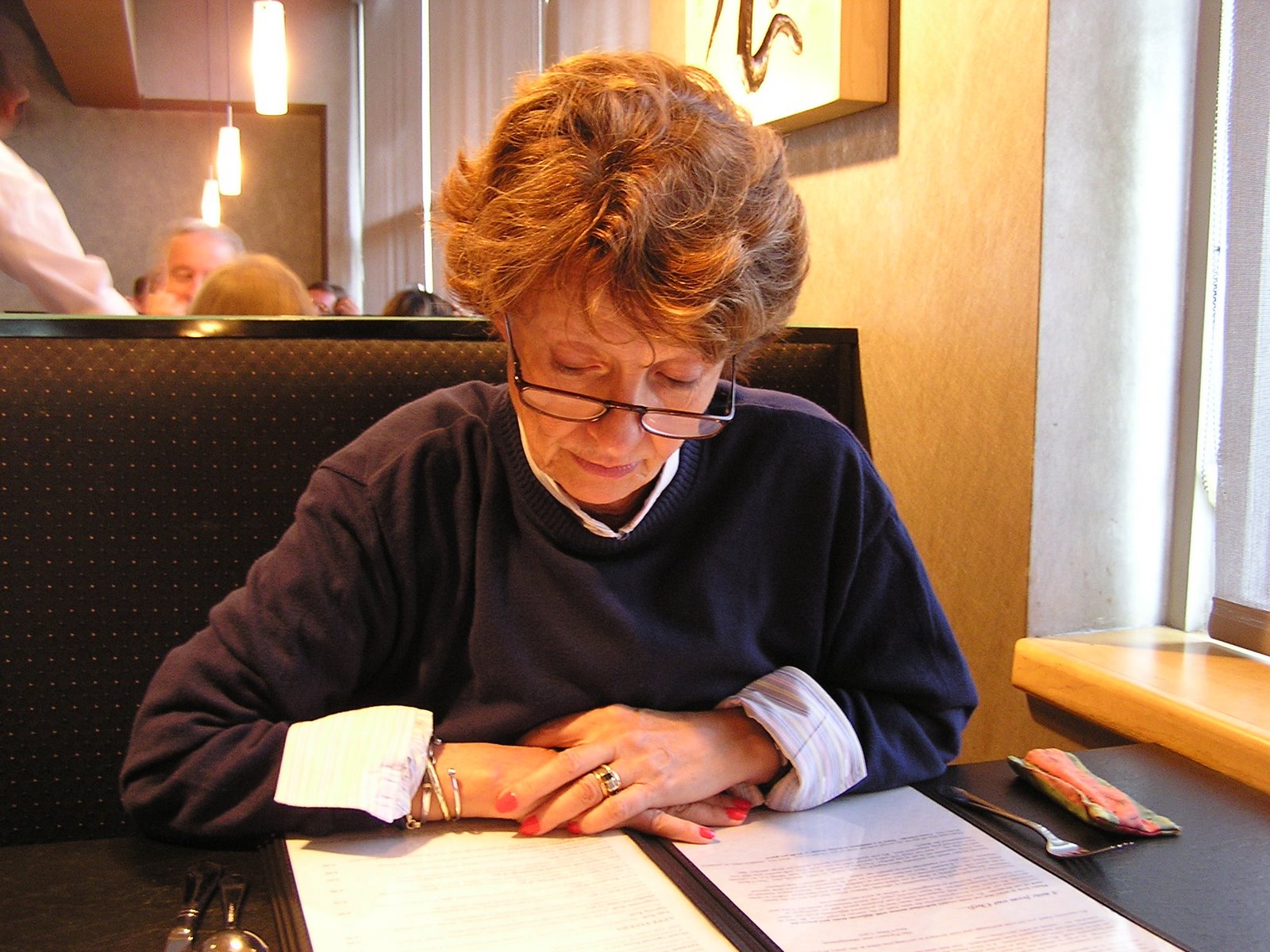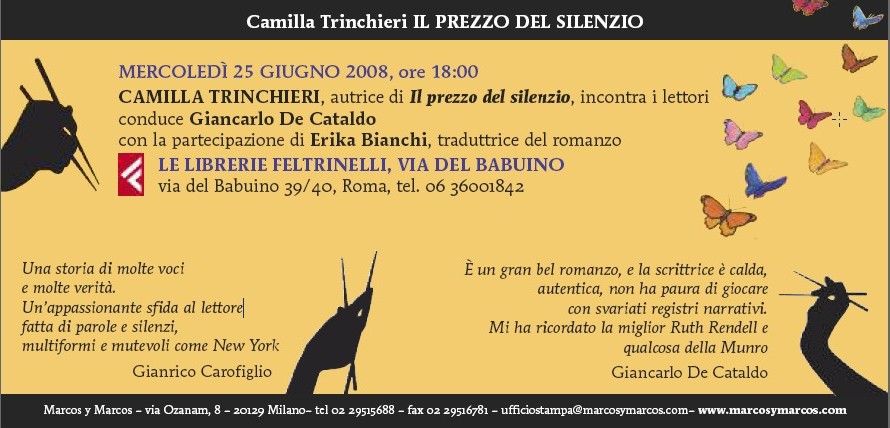Here is the English translation of the Mangialibri interview with Camilla Trinchieri that was posted earlier in this blog.
Interview with Camilla Trinchieri by David Frati of Mangialibri
I:A wound, something painful, is hidden behind the story you tell in The Price of Silence. Maybe more than one. Which one do you identify with—the wound coming from An-Ling’s childhood or the one Emma, the protagonist, bears as a mother filled with guilt?
C:My wound is more like An-ling’s, than Emma’s. I too didn’t have a mother. That’s my starting point, even for the lighter stories, the ones you can leave on a seat at the airport. I decided to start writing January 1st, 1986 .I remember that I came home with an idea in my head and I told my husband, “Do you mind if tonight you make dinner?” I wanted to write the story of my mother, but I needed to do a lot of research. I was born in Prague and it was still communist then. To obtain a visa took at least eight months. I would have had to wait without writing, but friends dissuaded me [from stopping] and I decided to write other stories in the meantime. I was working in an advertising agency at the time and my boss refused to give me a raise. I decided to write a novel in which he was murdered. That was the beginning of seven mysteries starring Simona Griffo, an Italian (the reviewer says Italian-American but he’s wrong), who loves art and cooking. They were published under the pseudonym of Camilla Crespi. At a certain point I said stop and decided to use my real name for this story, which isn’t autobiographical.
I: The novel has been translated from English into Italian, a language that you speak and write. What effect did it have on you to be translated in a language that you understand so well? It’s not something that happens everyday to a writer…
C: Having Erika Bianchi translate me into Italian was an incredible joy. I felt myself Italian and American at the same time; I felt whole. It was such a natural process that at a certain point I began to think that the book had even been thought in Italian. Only a few times did I have difficulties understanding a few convoluted passages, but then the original English would disappear and I found myself reading my book. It felt as if the translator no longer existed, that I had done everything.
I: Do you define The Price of Silence a legal thriller? What role does the trial have in your novel?
C: The trial wasn’t in the first draft. I thought of including it to help guide me through the story, but I asked myself: what do I know about trails? It just so happened that I was chosen to be part of a jury in a real trial, and seeing how the American judicial system worked ‘from the inside’ helped me pull it off. It wasn’t a murder trial, however. A guy had stolen $70,000 dollars from his sister.
I: What writers do you look to as reference points?
C: Henry James more than anyone else, even though when I first read him I found his spiraling narration heavy-going. Only when I started writing did I understand that he only hints at things. He never describes a situation openly. He circles around facts; he doesn’t reveal them. For my formation as a reader and a writer, Agatha Christie and all the mystery classics were also very important.
[David Frati-translated by Camilla Trinchieri]
skip to main |
skip to sidebar

News and notes about international author Camilla Trinchieri Spring 2008 - Present
News Blog for Author Camilla Trinchieri
The Camilla Trinchieri blog is updated as there is news or new links on the Web are discovered.
Please subscribe if you would like to see the updates as they are posted.
This is an Artist Blog created and developed by Anora McGaha, a writer and internet publicist.
Author Camilla Trinchieri has occasionally sent in content for a post, but this blog is primarily the work of Anora McGaha.
Please subscribe if you would like to see the updates as they are posted.
This is an Artist Blog created and developed by Anora McGaha, a writer and internet publicist.
Author Camilla Trinchieri has occasionally sent in content for a post, but this blog is primarily the work of Anora McGaha.
Press Releases
Finding Alice to be Published in Italian as Cercando Alice, January 2010
We're extremely excited to announce that Camilla Trinchieri's most personal book yet, based on her mother's life in Europe during World War II, will be published by MarcosYMarcos, the Italian publisher of the Italian translation of The Price of Silence!
Finding Alice will be translated as Cercando Alice by Erika Bianchi, translator of Trinchieri's prior book, Il prezzo del silenzio.
It will be released January 21st, 2010.
Finding Alice will be translated as Cercando Alice by Erika Bianchi, translator of Trinchieri's prior book, Il prezzo del silenzio.
It will be released January 21st, 2010.
Welcome! Ciao!
We love comments and welcome yours!
Siamo contentissimi che siete venuti cui per leggere notizie della scrittrice Camilla Trinchieri.
May 8, 2009 1 Year Anniversary of the Blog!
1224 page views as of May 2, 2009!
1147 page views as of April 2, 2009!
1100 in 10 months!
900 in 8 months!
Thank you for your interest!
Subscribe to the blog below so you can be updated automatically!
Siamo contentissimi che siete venuti cui per leggere notizie della scrittrice Camilla Trinchieri.
May 8, 2009 1 Year Anniversary of the Blog!
1224 page views as of May 2, 2009!
1147 page views as of April 2, 2009!
1100 in 10 months!
900 in 8 months!
Thank you for your interest!
Subscribe to the blog below so you can be updated automatically!
Subscribe to New Posts via Email
Subscribe to Camilla's Blog
Camilla Trinchieri

Author's Websites
Amazon Links: Buy one of Camilla's Books Here
Welcome! Ciao! Benvenuti! Ola! Marhaba! Huan Ying!
Thank you for stopping by at this rest stop on the internet highway. So much to look at, so much to find.
Camilla Trinchieri is an exciting and interesting author with 8 books to her name and essays and stories in several anthologies. She's published a fun mystery series The Trouble With , and now she's got a psychological thriller that's got a real grip.
Camilla is a great story teller, with tremendous heart and insight. Her multinational, multicultural upbringing gives a ready richness to her writing. She's got a keen eye also, honed in part through years in the film industry.
So if you have time, stop and take a look at her work, especially this latest book, The Price of Silence, which is a real page turner. It's like going for a roller coaster ride with some real gems along the way.
Camilla Trinchieri is an exciting and interesting author with 8 books to her name and essays and stories in several anthologies. She's published a fun mystery series The Trouble With , and now she's got a psychological thriller that's got a real grip.
Camilla is a great story teller, with tremendous heart and insight. Her multinational, multicultural upbringing gives a ready richness to her writing. She's got a keen eye also, honed in part through years in the film industry.
So if you have time, stop and take a look at her work, especially this latest book, The Price of Silence, which is a real page turner. It's like going for a roller coaster ride with some real gems along the way.
Interviews!
Reviews
- Amazon Canada Review(s)
- Amazon.com Reviews
- BarnesandNoble.com Reviews
- Bluestocking Impressions
- Book Avenue (Italian) Books Chosen for You
- BookLoons - Mystery Reviews
- Bookopolis, March 2009
- Bookslut - March 2007
- Chaos.com Reviews
- D la Repubblica delle Donne n 601 June
- Delphi Public Library's Read Spot
- Eclectica - "Dangerous Love" 2007
- Elle.it
- Gumshoe Review (June '08 & Aug '07)
- I Love a Mystery Newsletter, John Broussard Review
- Italian Literature Review - June '08
- Library Journal - June 1, 2007
- Limezine: La Citta Visibile (Florence)
- Miele Amaro
- Mysterious Reviews - a Betz Review
- Mystery Lovers Bookshop
- Mystery Scene - Summer 2007
- Old Bridge Library WebLog
- Overbooked - 2007 Starred Reviews
- Publishers Weekly Articles
- Publishers' Weekly
- Q Libri Reader Reviews in Italian
- Review Clips on Camilla's Website
- Romantic Times
- Tales of the SuperFast Reader
- The Mystery Gazette, May 22 '08
- The Thriller Magazine (Italian) May '08
Followers
Social Networks - Books, Blogs...
- aNobii - Books
- Blog Babel on Camilla Trinchieri (Italian)
- Blog Catalog
- BlogFlux Directory
- BookCrossing - Books
- Crimespace.Ning
- Dimibox on MySpace Listed Prezzo
- GoodReads - Books
- Italy's Splinder
- Libero News Article About the Sardegna Conference
- Library Thing - Books
- Liquida (Italian) Blog Posts re Camilla Trinchieri
- Shelfari - Books
- Technorati - Directory
- The Blog Directory
- Wikio. it - Camilla Trinchieri
About the Author
Camilla Trinchieri was born in Prague to an Italian diplomat father and an American mother. She has lived extensive periods in Italy and the United States. Her career spans years in the movie industry as a dubbing producer\director, working with some of the world reknowed directors: Federico Fellini; Luchino Visconti and Lina Wertmüller. In 1990 Camilla received her MFA in creative writing at Columbia University.
As Camilla Crespi, she has published seven mystery novels (the last four by Harper Collins) and has had three of them published in Germany by Knaur. The Trouble with Going Home was optioned by Dolphin Entertainment for a possible TV movie. Crespi has also written several short stories in the mystery genre.
As Camilla Trinchieri, the short story "Kitchen Communion" appeared in the anthology The Milk of Almonds edited by Edvige Giunta and Louise DeSalvo and published by the Feminist Press in 2002. A personal essay, "A String of Beads," is included in the anthology Unrooted Childhoods, edited by Faith Eidse and published by the Intercultural Press in January 2004.
Camilla has finished another novel, a food-filled mystery tentatively titled Gnocchi in Her Lap.
Visit the author's Website at www.CamillaTrinchieri.com.
As Camilla Crespi, she has published seven mystery novels (the last four by Harper Collins) and has had three of them published in Germany by Knaur. The Trouble with Going Home was optioned by Dolphin Entertainment for a possible TV movie. Crespi has also written several short stories in the mystery genre.
As Camilla Trinchieri, the short story "Kitchen Communion" appeared in the anthology The Milk of Almonds edited by Edvige Giunta and Louise DeSalvo and published by the Feminist Press in 2002. A personal essay, "A String of Beads," is included in the anthology Unrooted Childhoods, edited by Faith Eidse and published by the Intercultural Press in January 2004.
Camilla has finished another novel, a food-filled mystery tentatively titled Gnocchi in Her Lap.
Visit the author's Website at www.CamillaTrinchieri.com.
Labels
- Italy photos (15)
- Italian book launch (12)
- Camilla Writes (10)
- Il prezzo del silenzio (10)
- Book reviews (9)
- Italian reviews (8)
- Italy (8)
- The Trouble With... (8)
- Book summary (7)
- Recipes (7)
- Italian interview (6)
- Erika Bianchi (5)
- The Price of Silence (5)
- Finding Alice (4)
- Florence (4)
- Internet exposure (4)
- "Cercando Alice" (2)
- 2009 (2)
- Book reading (2)
- Palermo (2)
- podcast (2)
- Book covers (1)
- Camilla Trinchieri (1)
- Italian translation (1)
- Translated Interview (1)
FEEDJIT Live Traffic Map
Price Recommended in Listmania! Lists and More!
- "fun things to read", A Listmania! list by gygy "lady read a lot" (canada)
- A Thrilling Must Read Book, A Listmania! list by Catherine "Book Maven"
- Amazon List: Explore the Psychological Trend in Literature
- Birds of a Feather Flock to Good Fiction, A Listmania! list by Danielle Lane (Horseshoe, North Carolina)
- Blogpost about The Last Book Borrowed
- Camilla Trinchieri's Books, A Listmania! list by Anora Sutherland "Anora Egan" (Raleigh, NC USA)
- Go for the gusto mystery novels A Listmania! list by Madra James "Book Smart" (Canada)
- Have a Nice Day and Read a Good Book, A Listmania! list by Danielle Lane
- The Infinite Landscapes of the Mind, A Listmania! list by Allison (Florida)
- The Last Book Borrowed
Camilla Trinchieri - Other Web Listings
- A Celebration of Women Writers
- A Mystical Unicorn - Online Bookstore
- AARP, The Magazine - August 2007
- American Crime Writers League, June 2008
- Barnard College Alumnae Bibliography
- Blogorrhea - Small Press, Women's History Month
- Book Design Blog
- Breve Storie di Marcos Y Marcos
- Camilla's Books: Very-Clevery.com
- Center for Independent Publishing
- Clic News
- Cluelass.com - Bloodstained Bookshelf June 2008
- Clues Unlimited June 2008
- German Krimi Couch
- Google IT Books - The Milk of Almonds anthology
- Il Sottoscritto: Il Prezzo del Silenzio
- It Wikipedia, MarcosyMarcos, Autori Stranieri
- Magic Dragon
- Marcos Y Marcos Writers
- Sisters in Crime
- Spaziolaboratoriolacornice Blog
- Wuz Cultura & Spectacolo - Scrittori in Rete
- Yahoo Answers - Singapore - Psychological Fiction
This blog is created and maintained by Anora McGaha, a blogger, writer, poet and author providing writing and internet marketing and publicity services for writer and small businesses.



